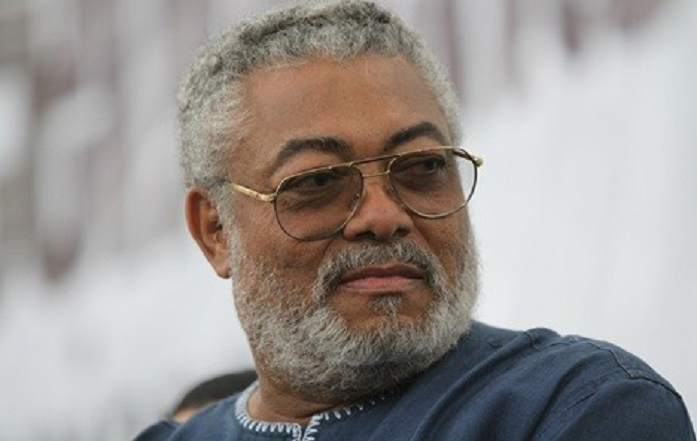
Rawlings advocates 2 five-year terms for presidents
Former President Jerry John Rawlings has advocated two five-year terms for Presidents serving under a constitutional democracy.
According to him, in most four-year terms, the first year was used for acclimatisation while the last year turned into a political crusade of campaigns, leaving but a year or less depending on the political climate.
Five-year terms, he explained, would allow for a greater chance of achieving political stride and development.
Ugandan MPs
Mr Rawlings made the suggestion when a delegation of Ugandan Members of Parliament called on him in his office last Thursday.
The delegation, which comprised members and officers of the appointments committee of the Ugandan Parliament, visited Ghana to assess the process of vetting and approval of presidential appointees, as well as other public officers in Ghana’s Parliament.
Led by Madam Alum Santa Ogwang, the other members of the Ugandan delegation were Ssewungu Joseph Gonzaga, Yeri Ofwono Apollo, Adoa Hellen, Rwabushaija Margaret, Birimbonwoha Pius Perry, Geria Beatrice Gladys and Kamayangi Glorious.
“Much as we belong to different geopolitical circumstances on the continent, I suggest that we shouldn’t be going beyond two five-year terms,” Mr Rawlings stated.
While acknowledging that there were exceptional situations, former President Rawlings said: “Whatever the imperfections, whenever we feel we cannot get justice from the executive through impeachment process or justice from the judiciary, at the end of the day we hope and pray and look forward to the electoral power; and if that is also being denied us, then we have a highly bottled up situation which isn’t good for stability.”
President Kufuor
In 2008, just before his tenure ended, former President John Agyekum Kufuor suggested that the presidential term should be increased to five years.
He again renewed calls for an extension of the tenure of presidents at an international Conference of African Philosophy and studies held at the University of Ghana in 2016.
This time around, however, former President Kufuor indicated that a six-year term would even be preferable, explaining that the framers of the 1992 Constitution may have overlooked the fact that a four-year presidency was not enough for effective development.
He said the constraints of leading a developing nation such as Ghana required more than four years to make any meaningful impact in terms of development.
Promotion
President Rawlings also stated that he did not promote himself to a higher military rank during his tenure as Head of State because of his respect for the rank structure.
“I decided not to promote myself over and above others because it belittles the rank structure and that is a form of corruption. I could not be seen to be fighting corruption and going against the spiritual essence of it. If I have to rely on the will of the people then I should not be doing things that would make me override and impose my will on them and deny them their right to be,” the former President said.
Handing over
In response to questions on why he handed over power peacefully when several African leaders had refused to do so, Flt Lt Rawlings said: “I was rather helping to empower our people. Being who I am, I wanted our people to be fearless and politically defiant because if they are not defiant they cannot fight wrong policies, corruption, thievery and other vices.
“People think I had so much power and could have stayed on. I couldn’t have stayed on even if I had wanted to because I had empowered our people to the extent that if I had attempted it, they would have defied me. I had no choice but to do the right thing,” Mr Rawlings stated.
Kayayei
The Ugandan Parliamentary delegation expressed their admiration for the peaceful nature of Ghana and its politics, particularly the seamless handover of political power from one elected leader to another.
The delegation also noted with concern the existence of the female porters (Kayayei) in the country and wondered why such a phenomenon still persisted in an era of affirmative action.
Members of the Rawlings team, Kobina Andoh Amoakwa, Donald Agumenu and Elikplim Katahena, took turns to explain to them that the fact that they had watched a kayayei documentary on Ghana television was indicative of the effort the country was making to combat the phenomenon.
They stated that the kayayei problem was a social one that required a holistic approach and so far progress had been made in offering vocational and educational opportunities for these girls and young women while creating an environment to prevent the migration of new girls from less privileged rural areas to urban centres.
Ms Katahena told the meeting that a great deal of work had gone into combating negative practices against women and the girl-child, including the virtual closure of witches camps such as the one in Gambaga.
On Ghana’s parliamentary vetting regime, Ms Katahena stated that Ghana got it right in making institutions such as Parliament stronger than individuals. “
The Executive as an institution is stronger than Presidents,” she noted.
“Vetting entrenches the support of the public and ensures a double cycle of accountability,” Ms Katahena added.
